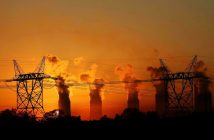- Absa Group has fallen behind its peers in adopting policies relating to climate change and fossil fuel financing since voluntarily included a “non-binding advisory vote on climate change risk and opportunity disclosure” back in it’s March 2020 AGM Notice.
In April 2020, Absa published a “Coal Financing Standard”, and in April 2021, it released its first standalone report on climate risk, partially aligned with the recommendations of the Financial Stability Board’s Task Force on Climate-related Financial Disclosures (TCFD).
However, policies relating to Absa’s oil and gas financing, promised for the first half of 2021, and a mining financing standard, promised for the second half of 2021, have still not been published.
In contrast, Nedbank, Investec, FirstRand and Standard Bank have each released a fossil fuel financing policy.
Last month, Just Share, non-profit shareholder activism organisation, sent Absa a draft non-binding resolution for discussion. The resolution asked that the group disclose, in 2023, its plans to set and publish a strategy and short-term, medium-term, and long-term absolute contraction targets for its financed greenhouse gas (GHG) emissions from its exposure to coal, oil and gas, on a timeline aligned with the goals of the Paris Agreement.
Financed GHG emissions are the emissions that banks and investors finance through their loans and investments – in other words, the emissions associated with the projects and entities to which they lend. The resolution therefore asked Absa to set targets to reduce its lending to the fossil fuel industry on a timeline consistent with keeping the global temperature increase to 1.5 degrees Celsius above pre-industrial levels (the “Paris goals”).
In numerous public disclosures, Absa acknowledges that climate change poses a material financial risk to its business, and commits to aligning its strategy with the Paris goals. However, none of Absa’s disclosures provides measurable commitments that show how, and when, Absa will implement alignment of its portfolio with climate science. It has not yet set, for example, any short-, medium- or long-term targets to reduce its exposure to fossil fuels.
In the explanatory memorandum to the draft resolution, Just Share highlighted that significant absolute emission reductions by 2030 are crucial for limiting temperature rise to 1.5⁰C. The latest report of the Intergovernmental Panel on Climate Change (IPCC) confirms previous findings that “rapid and deep and in most cases immediate” cuts to carbon emissions are required in all sectors; that net carbon dioxide emissions must fall by 48% by 2030 to avoid the worst impacts of climate change; and that “annual climate finance flows have to increase by between three and six times to meet average annual needs until 2030”.
As one of Africa’s largest diversified financial services groups with a presence in 12 African countries, the Absa Group’s lending, investing and other financial intermediary activities will influence the achievement of a just transition to a carbon free continent.
In conversations during early April, Absa set out its envisaged timing for future disclosures:
- The group committed to publishing its oil and gas standard in May 2022, along with an updated coal standard.
- The mining standard is being taken through the required governance processes ahead of publication scheduled for May.
- Absa’s next TCFD report will be published in mid-May.
Although Absa was prepared to table the resolution proposed by Just Share, it became clear during engagement with the group that it would most likely not be in a position, by the first quarter of 2023, to set short-, medium-, and long-term absolute contraction targets aligned with the Paris goals for its financed GHG emissions from its fossil fuel exposure.
In line with its peers, the group indicated that it requires more time to calculate its financed emissions before setting such targets, due to the complexity of this process.
Author: Bryan Groenendaal











